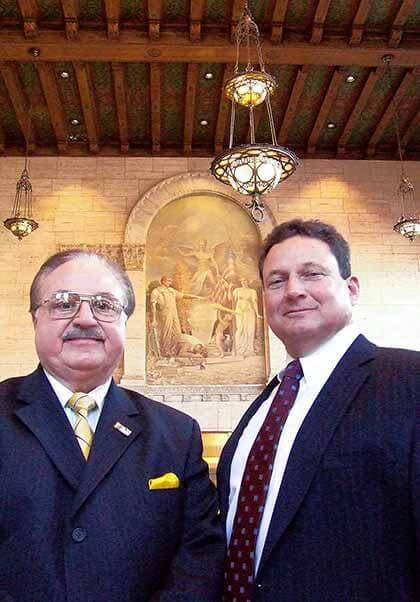By Joe Anuta
The flagship location of the Ridgewood Savings Bank at Forest and Myrtle avenues will celebrate its 90th birthday this year. The institution appears as successful as ever, and according to the bank’s president, it got that way by following some old-fashioned advice.
Customers have entered the grand lobby with its marble walls and high wooden ceilings since the bank was built in 1921 by 14 German immigrants who owned businesses in the neighborhood. Different waves of immigrants have come and gone throughout the ups and downs of the country’s economy, most notably the Great Depression and the Great Recession.
Peter Boger, president of the bank, has watched the current financial storm from the calm of his second-floor office, just like the nine presidents before him.
“We basically have fared through the recession very nicely,” Boger said. “The neighborhood has changed, but not much has changed in here.”
Boger employed the easy laugh of a man who relies on conventional wisdom when he discussed the bank’s longevity.
“If you look at the tortoise and the hare, we’re the tortoise,” he said.
And steadily plodding along the path to profitability was key when larger institutions were brought to their knees in 2008.
Boger outlined some of the reasons why his bank did not need any bailouts.
Most importantly, unlike corporate banks Boger did not have to satisfy his stockholders’ thirst for profit — there are none. Ridgewood Savings Bank is not publicly owned.
“If you have shareholders, you need to show profit every quarter — often at any cost,” he said.
His bank profits are primarily through mortgages and other loans to residents living near one of its 35 branches throughout the greater New York and Long Island area.
Mutual savings banks like Boger’s also avoided toxic and high-risk investments like hedge funds and derivatives, the latter of which many economists believed caused the economic downturn.
“We stick with what we know,” Boger said.
The bank has a lower delinquency rate than larger, flashier lending institutions like Chase or Citibank, according to Boger, since its vetting process is more thorough.
“We are more careful about who we load money to than bigger banks,” he said.
Ridgewood Savings Bank also connects with the community outside its sturdy walls by donating money to numerous charities in the area.
About 30 years ago, Ridgewood was full of mutual banks like Boger’s — although his is the largest in the state with $4.5 billion in capital — but many decided to go public, searching for profit at hare-like speeds.
And many found that profit when they were bought by larger banks, a temptation that Ridgewood Savings Bank has managed to avoid.
“We get Wall Street folks coming in here all the time, but we want no part of it,” he said. Boger prefers the financially stable model that has made the bank a trusted institution over the last century.
And the customers are nearly as conventional as the bank. Many still insist on using account books, the same way they have done for decades.
The paper device might seem like an excruciating alternative to instant Internet banking, but it might be the safest considering that the bank’s old-fashion way of doing business has not steered it wrong in 90 years.
Reach reporter Joe Anuta by e-mail at januta@cnglocal.com or by phone at 718-260-4566.



































